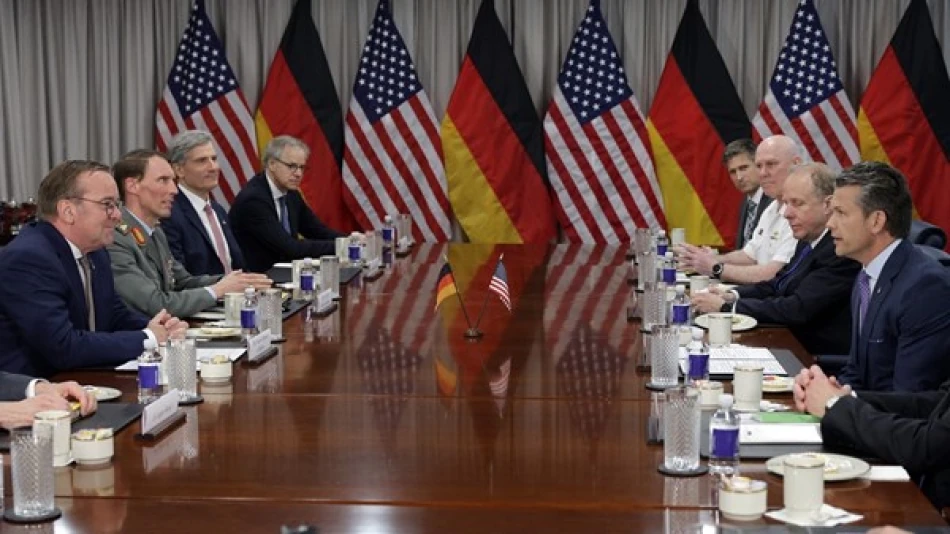
German Defense Minister Explores Diverse Agenda During U.S. Visit
Germany's €10 Billion F-35 Deal Signals Europe's Military Awakening Under Trump 2.0
German Defense Minister Boris Pistorius concluded high-stakes talks in Washington this week that could reshape Europe's defense landscape, with Germany committing to purchase Patriot air defense systems for Ukraine while advancing a €10 billion F-35 fighter jet acquisition. The meetings mark a strategic pivot as European allies navigate Donald Trump's transactional approach to defense partnerships, where military support increasingly flows through commercial channels rather than traditional aid.
The Patriot Deal: Europe Pays, America Supplies
The most immediate outcome of Pistorius's visit centers on Germany's agreement to purchase two Patriot air defense systems from the United States, specifically intended for transfer to Ukraine. This arrangement perfectly embodies Trump's stated preference for European allies to shoulder financial responsibility for regional security challenges.
Trump's remarks ahead of the German minister's departure were characteristically blunt: "For us, it will be a business deal. The European Union will pay, and we won't pay anything, but we will supply the weapons." This transactional framing represents a fundamental shift from the Biden administration's approach, where military aid often flowed directly from U.S. government coffers.
German Chancellor Friedrich Merz had previously announced Germany's willingness to purchase Patriot systems for Ukraine during a reconstruction conference in Rome, signaling Berlin's acceptance of this new cost-sharing model. The move reflects Europe's growing recognition that sustained support for Ukraine requires assuming greater financial responsibility, particularly under an administration that views defense relationships through a commercial lens.
The F-35 Gambit: Nuclear Deterrence in the Digital Age
Beyond Ukraine support, Germany's €10 billion commitment to acquire 35 F-35 Lightning II fighters from Lockheed Martin represents a strategic milestone for both countries. Scheduled for delivery beginning next year, these aircraft will serve dual purposes: modernizing Germany's aging air force and maintaining NATO's nuclear deterrence capabilities in Europe.
The F-35's nuclear certification allows German pilots to deliver U.S. nuclear weapons stored on German soil, maintaining the alliance's nuclear-sharing arrangement that has underpinned European security since the Cold War. This capability becomes increasingly relevant as Russia's invasion of Ukraine has renewed focus on nuclear deterrence in Europe.
Market Implications for Defense Contractors
The German F-35 order provides Lockheed Martin with crucial production stability as the program enters its mature phase. With over 3,000 F-35s delivered globally, international orders like Germany's help maintain production efficiency and reduce per-unit costs for all program participants. The deal also strengthens transatlantic defense industrial cooperation, creating long-term maintenance and upgrade revenue streams.
The Troop Question: 38,000 American Soldiers in Limbo
Pistorius's Washington visit also addressed the future of approximately 38,000 U.S. troops stationed in Germany, a presence that has anchored American military strategy in Europe for over seven decades. During his first presidency, Trump threatened significant troop reductions, viewing the deployment as an unnecessary expense.
However, Trump's recent comments suggest a more pragmatic approach: "If Germany wants American soldiers, I'm okay with that, that's not a problem." This shift likely reflects recognition that U.S. bases in Germany serve American strategic interests, providing crucial logistics hubs for operations across Europe, Africa, and the Middle East.
The troop presence also generates significant economic benefits for local German communities, creating a mutual dependency that complicates any withdrawal scenario. Unlike Afghanistan or Iraq, the German deployment faces no security threats and enjoys broad public support in both countries.
Missile Deployment: Biden's Legacy in Question
A key uncertainty emerging from the talks concerns Trump's commitment to his predecessor's promise to deploy intermediate-range missiles in Germany. The Biden administration had pledged to provide Tomahawk cruise missiles with 2,500-kilometer range, SM-6 air defense missiles, and new hypersonic weapons beginning in 2025.
This deployment would mark the first time since the Cold War that U.S. intermediate-range missiles would be stationed in Europe, representing a significant escalation in NATO's deterrent posture toward Russia. Trump's silence on this commitment suggests potential reconsideration, possibly viewing such deployments as unnecessarily provocative or preferring to use them as negotiating leverage with Moscow.
The Broader Strategic Context
Germany's military modernization efforts reflect broader European recognition that the continent must assume greater responsibility for its own defense. The Ukraine conflict has shattered post-Cold War assumptions about European security, forcing nations like Germany to abandon decades of military restraint.
Similar patterns are emerging across Europe, with Poland committing to NATO's largest defense spending increase and Nordic countries accelerating military integration. The German F-35 purchase places Berlin alongside other European F-35 operators including the UK, Italy, Netherlands, and Norway, creating unprecedented interoperability within NATO's air forces.
For American defense policy, the German approach offers a template for Trump's broader alliance strategy: allies assume greater financial responsibility while maintaining strategic cooperation through commercial relationships. This model could extend beyond Germany to other wealthy allies, potentially reshaping how the United States structures its global military presence.
The success of this transactional approach will largely depend on whether European allies can maintain political support for increased defense spending while navigating their own economic challenges. Germany's commitment suggests that at least some European powers are prepared to pay the price for continued American security cooperation, even under Trump's more demanding terms.
Most Viewed News

 Layla Al Mansoori
Layla Al Mansoori






